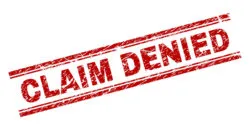 When an employee opts for disability insurance through their employer’s plan or private registration, they may be later shocked when their application for long-term disability is denied.
When an employee opts for disability insurance through their employer’s plan or private registration, they may be later shocked when their application for long-term disability is denied.
Yet it is through an established denial and appeal process, often involving more than one push back by the insured, that benefits are finally actualized. The help of a knowledgeable disability denial attorney can be invaluable, ensuring that you cover all requirements during the appeal process.
It is important upon your first disability denial if not before, to start a file and begin to document everything about your disability as well as denials and appeals.
The first step in this documentation process is carefully reading the letter sent to you in which your long-term disability is denied. Generally, denial letters spell out the reasons behind the denial and tell you how the appeal process works with your policy.
What is the Employee’s Retirement Income Security Act (ERISA)?
As indicated by the U.S. Department of Labor, ERISA protects participants in employee retirement and welfare benefit plans as well as their beneficiaries. The law was primarily established to protect the pensions and benefits of workers in private industry from loss of retirement income and other benefits in the event of bankruptcy and other serious financial economic swings.
ERISA sets standards by which plan managers and other fiduciaries must operate, including long term disability insurers. The standards include acting in the best interest of the body of insured and offering clear and transparent information about plan benefits and processes—including the process of questioning the denial of a disability insurance claim, along with the appeals process timeline.
The denial letter—because of ERISA standards—will spell out deadlines you need to meet in order to register an appeal if your long-term disability is denied on the first try. It’s not a bad idea to get a calendar and mark it with the deadlines to be sure you file your appeal on time.
The next step is to request your claim file from the insurance company in writing immediately. You can also add to this claim file request, a request for a copy of your long-term disability policy. Copies of this and your claim file should be guaranteed free of charge under U.S. law. Alternatively, an employee can also seek a copy from the human resources office where they work.
The next step in the process of an appeal is a thorough review of the claim file once it is received. Medical information must be thorough and can complete and include physician notes, diagnostic results from lab work as well as MRIs, X-Rays, and CT Scans. If there have been any surgeries or adjunct visits to emergency rooms, information from these must be included in the record.
It would be beneficial after gathering all the necessary information to fill the gaps to get a written opinion by a doctor who is willing to truly access your case in total. You may have to shop around for a physician willing to give his or her time to be thorough.
Finally, appeals can be best argued with adjunct letters from family members, acquaintances, and friends which have directly observed your disability on a day-to-day basis. The review and opinion of a vocational specialist is also a helpful addition to an appeal.
The appeals process is not simple. Getting the advice of an experienced disability insurance attorney may be the best thing you can do to help get your denial overturned.
Do YOU have a legal claim? Fill out the form on this page now for a free, immediate, and confidential case evaluation. The bad faith insurance attorneys who work with Top Class Actions will contact you if you qualify to let you know if an individual lawsuit or Unum class action lawsuit is best for you. [In general, Unum bad faith lawsuits are filed individually by each plaintiff and are not class actions.] Hurry — statutes of limitations may apply.
ATTORNEY ADVERTISING
Top Class Actions is a Proud Member of the American Bar Association
LEGAL INFORMATION IS NOT LEGAL ADVICE
Top Class Actions Legal Statement
©2008 – 2026 Top Class Actions® LLC
Various Trademarks held by their respective owners
This website is not intended for viewing or usage by European Union citizens.
Get Help – It’s Free
Join a Free Unum Class Action Lawsuit Investigation
If you were denied a disability claim or had your Unum disability benefits terminated without reason, you may be able to take legal action against the insurer. See if you qualify by filling out the short form below.
An attorney will contact you if you qualify to discuss the details of your potential case at no charge to you.
PLEASE NOTE: If you want to participate in this investigation, it is imperative that you reply to the law firm if they call or email you. Failing to do so may result in you not getting signed up as a client or getting you dropped as a client.












